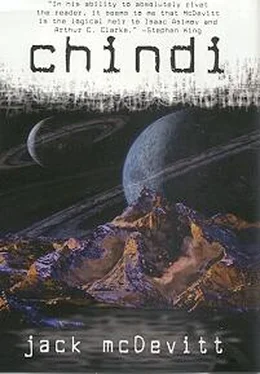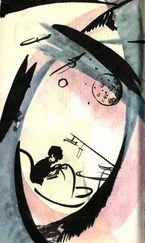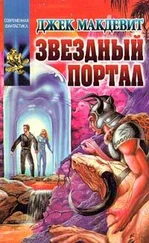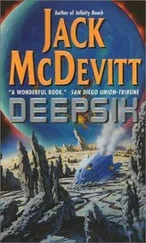Thank God. They’d get him off in two hours. They were waiting out there for him. He raised a fist in triumph. Two hours was good. He could live with that. Yes indeed. He laughed at his little joke. “Thank you, Hutch.”
“Tor, we’re asking the crew to help. The aliens.”
The aliens? “Hutch, can you hear me?” Hell, there were no aliens. “Hutch, where are you? Please respond, damn it.”
“I’m sorry, Tor. I wish there were more we could do.”
It made no sense. “Hutch, there’s nothing alive out here except me.”
“You won’t be able to talk to me. You’ll only be in range for an instant. We estimate you’ll pass us at seventy-five thousand kilometers per second.”
No, that wasn’t true. Couldn’t be true. The stars were motionless. The chindi was motionless. “There’s been a mistake,” he told her. “I’m adrift. Not moving at all.”
He waited, and then he called her name. He stood up and looked out at the stars. “That’s not what happened,” he said. “Hutch…”
SHE CONTINUED TO talk to him, telling him they were trying to figure out what they could do, that she was sorry, that she would do anything to get him off…The transmission was periodically overwhelmed by long periods of interference. Betelgeuse saying hello.
He’d been strolling about on the outside, wandering among the hills and rock barrens. He remembered Hutch, long ago, commenting how archeologists were forever unearthing antique structures and extracting what they could from them, and how they always ended by commenting What a story you could tell if you could only talk.
They liked to think they were able to make the old temples talk. That they listened to the tools and the pottery and, at Beta Pac, the long-dead alien orbiter. But they knew, Hutch had said, it was a very limited conversation. Even the king’s name tended to get lost.
But the eyes of the chindi were, it seemed, everywhere. And its voice spoke to anyone who could figure out how to get aboard. Had that been the intention? Was this thing a gift to anyone able to find it? Or had it gotten lost?
He was running low on air, so he went back to the exit hatch, looked down, and was pleased to see that his dome was still there. Every time he returned he held his breath, aware there had been a chance that, while he was gone, the robots would have hauled it off. Cleanup crew, you know. Can’t have trash lying about.
He’d experimented by leaving a few crumpled pieces of paper in various corridors. They’d invariably disappeared a day or so later. But they never took the dome away.
Somebody knew. Maybe they didn’t know how to help him.
He climbed back down the ladder. One of the robots was approaching. It had to move to one side to get around the dome.
He stepped in front of it and it stopped. The black discs that served, presumably, as eyes, locked on him.
“Hello,” he said. “Take me to your captain.”
The robot waited.
“Can you understand me? I’m stranded. I need help.”
It tried to move past, but he stayed in front of it. “You guys are interested in everything else. But we invade you, and you don’t notice. Why is that?”
They were caretakers. He’d climbed aboard one several days ago and ridden it until it turned into one of the chambers. The thing had begun running a program, a bloodcurdling spectacle in which a city built of marble, overlooking a sea, was attacked by a cloud. One of the omega clouds, he thought, the things that came out of galaxy central in waves every eight thousand years or so to attack pieces of geometry. One of the last great mysteries.
The images had been indistinct, and the robot put everything back into focus and left. It had never paid any attention whatever to Tor.
He spent a lot of time on his journal, recording his experiences among the displays and outside on the hull. (Since the Memphis had left he no longer had the capability of recording the displays themselves.) But when he read over his comments and found that they’d become maudlin, he went back and made deletions. Rerecorded everything. Eventually, he knew, someone would come. Any last words he left would become part of the chindi legend. So he tried to remain cool, aloof, archly amused. He pictured people at the Smithsonian looking at a mock-up of one or another of the display chambers. And eventually coming to the Thoughts of Tor Vinderwahl.
Yes, cool and aloof. The sort of person they’d all have wanted to know.
He watched the robot trundle away, disappearing finally around a corner, thinking how glorious it would be if it worked, if it went directly up to the bridge and summoned the captain. Tor’s waiting down near the exit hatch, sir. He needs a couple of canisters of oxygen. Just enough to get him through until the Memphis can come alongside and collect him. It’s been good to have you aboard, Mr. Vinderwahl. Do come again when you’re in the neighborhood.
HE WENT INSIDE the dome and refilled his tanks. The status lamp was getting dim. He stood in front of the pump feeling lost and alone and very sorry for himself. And then he shook it off as best he could and went back outside to wait for the Memphis to pass by.
Hutch was also outside, on the hull of her ship. She said so, twice. He checked the time. Only a few minutes away now. Of course, there was no way to know whether she was being exact. Usually when people use an expression like we’ll be there in an hour and a half, there’s a certain amount of loose change in either direction.
“Hutch,” he said into the commlink, “I wanted to spend the rest of my life with you.” He grinned. It looked as if that was going to happen.
The flat level buzz of the universe came back. If you listen closely, the old song lyric went, you can hear Betelgeuse.
“I’m still here, Tor.”
Hutch’s voice again, electrifying in its imminence, as though she sat behind him, or behind one of the ridges.
“Hutch, can you hear me yet? Tell me if you can hear me.”
“You’re only a few seconds away now. I wish you could talk to me.”
As do I.
The ridges out on either side of the exit hatch were low. Barely ripples in the rock. But he selected a spot that seemed the highest place, although he could almost have seen over it. He walked to it, shook his head, and climbed it. The Memphis should be straight ahead. Somewhere beyond the front of the chindi. Beyond where the ridges meet. Somewhere.
He waited patiently, shielding his eyes from a nonexistent glare. There was movement off to one side. But it was only a spray of dust. A micrometeor.
And then: “I love you, Tor.”
Well, that last was good news anyhow.
THERE WAS A subtle change in the transmission, in her voice, informing him he was on the downside of the Doppler. “Good-bye, Priscilla,” he said.
He stayed on his feet, wishing that a stray rock would take him, remove any need for decision on his part. Get it over.
She’d been right. Nothing in the chindi had been worth his life. It might have been worth dying for in some obscure philosophical sense. But only if someone else did the dying. When Pete and Herman and the others had lost their lives it had seemed brave and noble, making the ultimate sacrifice for the ultimate cause. Opening a window through which the species could at last get a sense of its neighbors.
But the presence of Priscilla Hutchins on the Memphis underscored why it was better to live.
HE WENT BELOW again, and wandered back to say good-bye to Wolfie.
The corridors that had once seemed so broad and spacious now crowded him. The werewolf waited in the dark. Another creature far from home.
Lost travelers.
He stood gazing at it by the light of his wristlamp. The implications of what Hutch had said about the chindi’s velocity had begun to make sense, and he was feeling even more isolated. While he stood facing the image he realized why the chindi had never jumped, why it traveled at high speed. And he began to sense how truly old the ship must be.
Читать дальше








